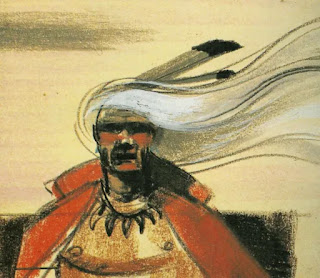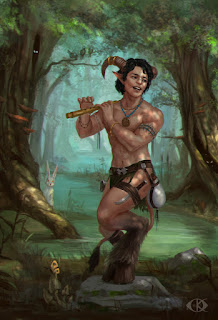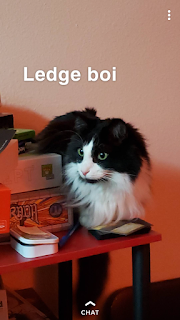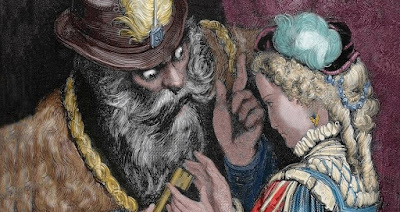Week 10 Story: Hiawatha and the Hare
 |
| Hiawatha |
Soon came a hare to the circle of wigwams, a meager beast of little more than bones and fur. It hopped to Hiawatha, seated within his dwelling next to a fire consuming a small ration of maize dried last harvest. The great warrior saw the pathetic look of the rabbit, and extended his hand to the creature in an act of mercy. The hare began to eat the morsels, the little food Hiawatha had remaining, and soon its strength seemed to return. It energetically began to escape, but indicated to Hiawatha to follow. The weakened warrior paid heed, and set off behind the creature.
They traveled for what at first was hours, then days, but Hiawatha was not permitted to break by the pace of the hare. Soon the chill of the air softened, and a distinctly warm breeze took hold of the pair. At last, pushing through one last bush, Hiawatha was shown the destination: a grove of wild fruit, untouched by the cold. Quickly, he began to try to fill his arms with fruit to return to his village, but could not carry much for as strong a warrior he was - as he began to take fruit, one would fall out. He began to think on how to overcome this odd quandary, and looked to the skies in thought. There, he saw the canopies of the trees interweaving with one another to form a beautiful mesh. Now inspired Hiawatha began to gather leaves and vines of the trees, fashioning them into a weave tighter than the canopy. In few tries he was successful, and filled his canvas with a great number of fruits, weighing more than a beast of prey. When he returned to the wigwams, there was much rejoicing in his name as they knew they could survive the frost.
Author's Note: This is a story based on the legendary tales of Hiawatha taken as origin stories for various things in their society. For this one, we have the moral of mercy leading to a grand banquet of fruit to save the people (once again), and offers the origin of weaving baskets from the interlacing of the tree canopies. Due to my unfamiliarity with this specific culture, I was hesitant to use more Native words for fear of misuse.
Bibliography: The Song of Hiawatha, UnTextbook



Hey Gage!
ReplyDeleteYour story reads like a quintessential folk tale. I had the impression that this story had been passed down to you, and now you were now upholding the convention. Being a traditionalist, I ate it up. I also really liked the image you chose. Its simple yet bold style perfectly compliments the aesthetic of your story.
Hey there Gage,
ReplyDeleteYou story really did read like an old folktale. I really though that the story had been passed down to you from generations on end. I am not normally one that likes traditional stories, but this one was very well written, and you did a great job with it! I look forward to reading more from you!
Hey Gage,
ReplyDeleteI really enjoyed reading your story! I was interested and entrenched from the beginning since I also read Hiawatha (and utilized the same image in my own post) and wanted to see what you did with the source material, and it was really cool! I like the idea of the oral tradition and passing it down from generation to generation. Great work!
Hey Gage,
ReplyDeleteI enjoyed this story quite a bit. It seems like it is by far one of the most realistic stories from mythology. I really liked that Hiawatha's act of mercy was paid back to him so well. In your author's note you didn't mention which native group this was a part of. I am just curious where it came from? Anyway, enjoy the last few weeks in the semester!
Brady
Hey Gage,
ReplyDeleteI love the story. It was so nice to see a story where someone being nice ended out well. Some suggestions I had were to maybe space the story out a lot more, so it is not one big paragraph and also add dialogue to engage the readers even further. Other than that, I think you write very well. Good luck and push through these last few weeks of school!